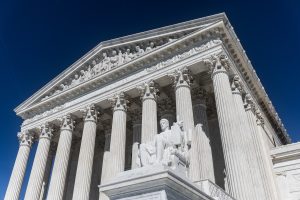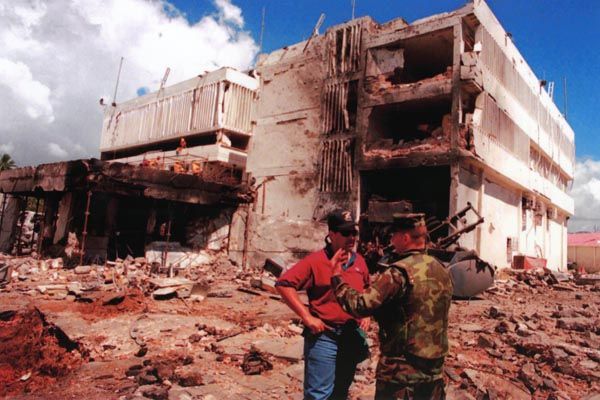Sudan has been sued over both the embassy attacks and the bombing of the USS Cole in Yemen in October 2000.
The U.S. Supreme Court says that Sudan cannot avoid punitive damages in settling lawsuits which accuse the sub-Saharan African nation of conspiring with al-Qaeda to bomb American embassies in Kenya and Tanzania.
The two attacks, says Reuters, both took place in 1998, killing 224 people and injuring many more. Some survivors, as well as family members of the deceased, have accused Sudan of essentially sheltering al-Qaeda throughout the mid-1990s.
Al-Qaeda founder Osama bin Laden, for instance, was offered political shelter by Sudanese authorities until at least 1996, when he was asked to leave the country under intense pressure from the United States.
While Sudan has been cooperating with victims’ lawsuits—the country wants to remove itself from a list of state sponsors of terrorism–its transitional government has argued against paying punitive damages to plaintiffs in the two embassy cases.

However, the Supreme Court ruled 8-0 against Sudan on Monday, vacating a lower court’s 2017 decision which had freed the country from its obligations to pay punitive damages atop $6 billion compensatory damages.
Christopher Curran, an attorney representing Sudan, said the justices’ ruling reinstates about $826 million of the $4.3 billion in punitive damages initially demanded.
According to Reuters, the justices’ decision hinged on the Court’s interpretation of a 2008 amendment to the Foreign Sovereign Immunity Act. The FSIA generally prohibits U.S. citizens from filing civil lawsuits against foreign governments, barring certain exceptions.
The U.S. Circuit Court of Appeals for the District of Columbia Circuit in 2017 upheld Sudan’s liability in the attacks, but said the FSIA’s 2008 amendment could not be retroactively applied to the embassy attacks.
Justice Neil Gorsuch, though, wrote in Monday’s ruling that Congress clearly had a different intent.
“Congress was as clear as it could have been when it authorized plaintiffs to seek and win punitive damages for past conduct,” Gorsuch wrote.
The justices also asked the D.C. Circuit to reconsider another aspect of its decision, which prohibited foreign nationals participating in the lawsuit from seeking punitive damages against Sudan. Reuters notes that a dozen Americans were killed in the August 7, 1998 attacks outside the U.S. embassies in Nairobi, Kenya, and Dar es Salaam, Tanzania. Most of the lawsuits’ 567 plaintiffs are non-U.S. citizens who either worked for the U.S. government or were related to employees killed in the bombings.
Sudan, for its part, maintains that it is cooperating with the lawsuit only to win political concession—on the side, its transitional authorities have repeatedly said the country never aided al-Qaeda or encouraged acts of terror against the United States.
“As always, Sudan expresses sympathy for the victims of the acts of terrorism at issue, but reaffirms it was not involved in any wrongdoing in connection with those acts,” Curran said in a statement.
Matthew McGill, an attorney for the plaintiffs, said he and his clients are pleased with the justices’ finding.
“It’s hard to imagine an act more deserving of punitive damages,” McGill said of the bombings, “and we are deeply gratified that the Supreme Court has validated our clients’ right to receive this measure of compensation.”
Sources
Sudan ‘must pay’ US East African embassy attack victims
U.S. Nears Settlement With Sudan Over 1998 Terror Bombings
U.S. Supreme Court heaps more damages on Sudan in embassy bombing cases


Join the conversation!